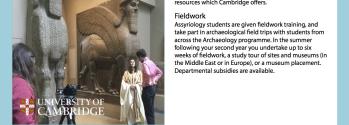
Cambridge offers an outstanding environment for undergraduate study of ancient Mesopotamia, which is taught within the University's Archaeology "Tripos" (i.e. degree) - UCAS code V400. Students can acquire an in-depth knowledge of the languages, literature, history and archaeology of the region
Assyriology is available as a specialist "track" within the three-year degree in Archaeology. Those not taking the Assyriology "track" can still study Mesopotamian archaeology (but not the languages) within the general Archaeology "track".
A combined specialist "track" in Assyriology and Egyptology is also available. This involves learning both Babylonian and Egyptian.
Course structure
First Year (Part I)First-year students take four papers out of a choice of eleven. Up to three can be on Mesopotamia or Egypt.
A3 is an introductory survey of Mesopotamian and ancient Egyptian history, culture and archaeology and provides a background for the more detailed Part II modules. A3 is taken by most students wishing to specialise in Assyriology and/or Egyptology and is also an option for students not taking ancient languages.
M1 is Introductory Babylonian; during this first year of language study, students learn the grammar of Old Babylonian (as used in the lawcode of Hammurabi) and standard Babylonian as used in the inscriptions of Sennacherib. They learn cuneiform signs in their Neo-Assyrian forms.
Most Assyriology students will combine papers A3 and M1, with two further papers chosen from Egyptian language (E1), World Archaeology (A1) and Archaeology in Action (A2), Biological Anthropology (BAN1) or Social Anthropology (SAN1). Papers in Politics, Sociology and Psychology are also available.
Part II (Second and Third Years)
Assyriology is a specialist option within the Part II Archaeology course. Advanced Babylonian and Assyrian language papers at Part IIA and IIB extend the range of texts and dialects studied, including royal and private correspondence and legal documents of the Old Babylonian (c 1800 BC) and Neo-Assyrian (c 700 BC) Periods, and a variety of literary and religious compositions. (It is also possible to begin Babylonian language from scratch in Part IIA).
As well as Babylonian language, there are three further papers to take in Part IIA; Assyriology students have a choice from: Mesopotamian archaeology, Mesopotamian culture, archaeological theory or practice, or any one of a range of regional options (Egyptian archaeology or Indus archaeology being perhaps the most appropriate). The archaeology and culture (literature, religion and social history) papers each run on a two-year cycle, and students in Assyriology normally will take the alternate half of any of these papers in the final (Part IIB) year. At Part IIB students also take advanced language and may add elementary Sumerian and/or write an independent research dissertation.
The Mesopotamian archaeology and culture papers are also available to students following the regular Archaeology B.A. course, as one of their regional options, in both second and third years; they also may be taken by students specialising in other subjects of HSPS (e.g. Politics).
Fieldwork
There is a requirement for 6-weeks of practical experience during the Assyriology course, to be acquired over the summer or Easter holidays. There are opportunities to participate in archaeological fieldwork or museum research projects. Some funding is available towards your costs of fieldwork and projects.
Further information
We are always happy to answer prospective applicants' queries about the course. Email Dr Jonathan Tenney at jt812@cam.ac.uk
How to apply
Applications for undergraduate study are made directly to colleges through the UCAS system; for details, please visit the Undergraduate Admissions webpage. Applicants for Assyriology should apply for the Archaeology course (UCAS code V400), clearly specifying their interest in the Assyriology/Mesopotamia option, in order to assist Colleges in identifying an appropriate subject interviewer.
All the Colleges accept applications for the Archaeology course. A list of Colleges and their staff interests can be found here. Teaching staff in Assyriology and Egyptology are fellows of Newnham, Jesus, and Emmanuel Colleges.
For more details on the application process please see the How to Apply page in the Prospective Undergraduates section.

Suggested Reading List for Prospective Undergraduates
We do not expect prospective undergraduates to have read all the works below, but any one of them would be an excellent starting point around which to build more readings.
Archaeology and Art:- Collon, D. 1995. Ancient Near Eastern Art. University of California Press.
- Crawford, H. 2017. Sumer and the Sumerians. Cambridge University Press.
- Oates, J. 1986. Babylon. Thames & Hudson.
- Pollock, S. 1999. Ancient Mesopotamia. Cambridge University Press.
- Roaf, M. 1990. Cultural Atlas of Mesopotamia.
- Kuhrt, A. 1995. The Ancient Near East, c 3000-330 BC. Routledge.
- Postgate, J.N. 1992. Early Mesopotamia, Society and Economy at the Dawn of History. Routledge.
- Snell, D. 1997. Life in the Ancient Near East. Yale University Press.
- van de Mieroop, M. 2003. A History of the Ancient Near East, c 3000-323 BC. Blackwell.
- George, A.R. Babylonian and Assyrian. In J.N. Postgate, ed., Languages of Iraq Ancient and Modern. British Institute for the Study of Iraq.
- Finkel, I. L. and Taylor, J. 2015. Cuneiform. British Museum.
- Charpin, D. Reading and Writing in Babylon. 2010. Harvard University Press
- You can listen to recordings of modern scholars reading Akkadian at www.speechisfire.com
- Dalley, S. 2000 rev. ed. Myths from Mesopotamia. Oxford University Press.
- Foster, B. 2005 (3rd ed.). Before the Muses: Anthology of Akkadian Literature. CDL Press.
- George, A. 1999. The Epic of Gilgamesh. Penguin.
- You can listen to recordings of modern scholars reading Babylonian (Akkadian) at www.speechisfire.com


